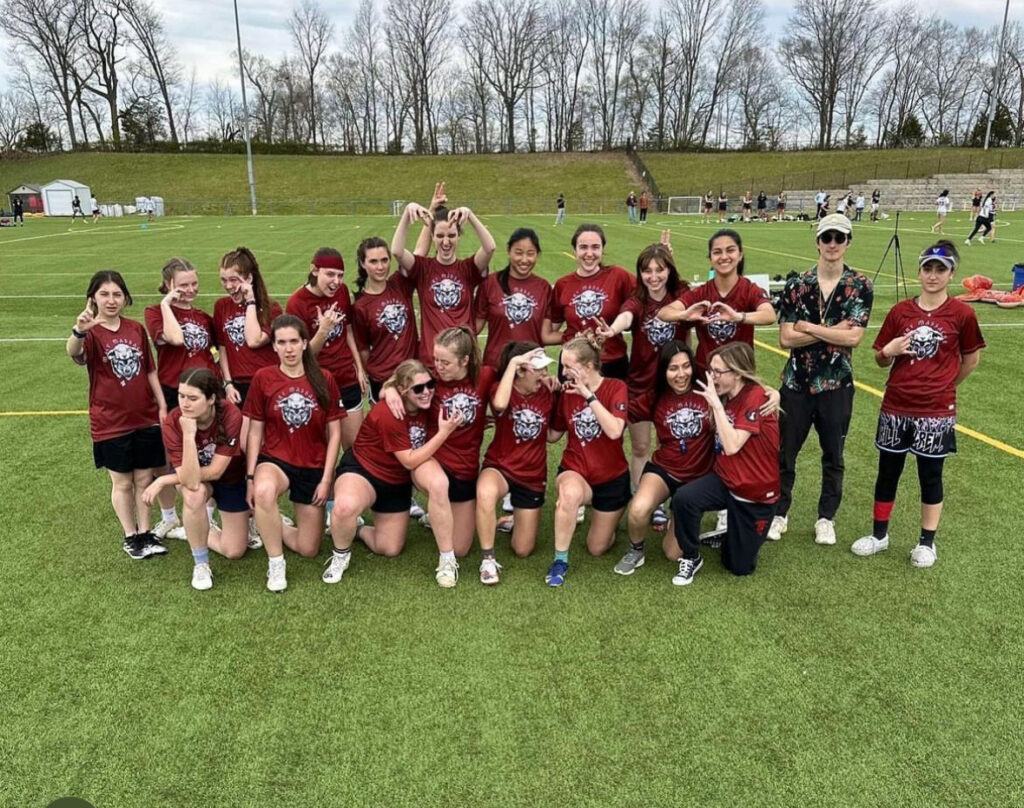Balancing athletics and academics in rec sports
3 min read
The women's club frisbee team, Mary Massacre, have fun on and off the field. | @mary_massacre_umw, Instagram
by GRACE WAGNER
Staff Writer
Joining a recreational team offers students many great opportunities from honing new skills to making lifelong friendships. Rec sports enhance the college experience by promoting physical and mental well-being, fostering social connections and instilling valuable life skills in students. They also help combat a sedentary lifestyle associated with academic pursuits, which helps balance the importance of physical fitness and scholarly work for students.
At UMW, there are a variety of recreational teams to join, from fencing to field hockey, so there is bound to be a team that can accommodate students of various backgrounds and preferences.
“Having club sports and all the Campus Rec activities just makes it so everybody can stay active,” said Maggie Hatton, a junior marketing major. “Everybody can meet other people and it’s not just secluded to only the varsity teams.”
Some students who participated in sports in high school may seek similar athletic involvement in their collegiate careers, but they worry about the time commitment of each. In recreational sports, there is more leniency for student-athletes, yet they still offer a positive and committed team environment.
Balancing academic commitments with recreational sports also teaches students valuable time management and discipline skills. As such, students learn how to effectively manage their schedules and maintain a healthy work-life balance by incorporating exercise into their lives.
Mary Washington’s recreational athletes work hard to balance their academic work while participating in athletics.
“We all prioritize school first,” said Isabella Barrón, a sophomore psychology major and rec soccer player. “If you have to miss a practice or game because you have too much work, then everybody is super understanding about that. But everybody also understands that this sport is a commitment.”
On recreational teams, students learn how to be better teammates, which helps them in the classroom and beyond. Whether working in a group for a project or participating in a Socratic seminar, being able to communicate and work together towards a common goal is the name of the game.
Participating in team sports also provides valuable lessons in perseverance, time management, discipline, resilience and goal-setting. Students learn to communicate effectively, resolve conflicts and work towards common goals, which are essential skills for success in both personal and professional life—and with recreational sports, these skills are not a limited privilege to varsity athletes.
“Soccer is my social life,” said Barrón. “It’s a great networking opportunity, honestly. It’s just getting to know people who know more people and it’s a great way to meet.”
Additionally, participating in recreational sports can have positive effects on mental health by reducing stress, anxiety and depression. Physical activity releases endorphins, which are natural mood lifters, and it provides an outlet for students to unwind and recharge amidst the pressures of academic life.
“It’s so easy to stay at home, right? But then I just think about things getting active and seeing friends and having fun, and I’m like, ‘Okay, I’m going to practice,’” said Maggie Corcoran, a senior psychology major and rec soccer player.
One of the most important parts of being in college is building relationships. Joining sports teams or intramural leagues fosters a sense of community and belonging, leading to lasting friendships and support networks on campus.
“I’ve met a lot of people through rec teams,” said Theresa Oetgen, a freshman track and rec soccer player. “I do consider a lot of them my friends, so it does help me be more open.”
Team environments house important relationships, for students can see themselves and others as mentors and learn a lot from each other while also becoming friends.
“I met all my friends through club soccer and I keep meeting new ones,” said Hatton. “It completely changed my social life around, and now I’m always on campus.”










